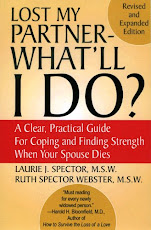
7/28/22
reflections: quotes for getting through the days; part 4

1) No obstacle will ever leave you the way it found you.
- Anonymous
2) The risk of love is loss, and the price of loss is grief –
But the pain of grief
Is only a shadow
When compared with the pain
Of never risking love.
- Hilary Stanton Zunin
3) Suppressed grief suffocates, it rages within the breast, and is forced to multiply its strength.
- Ovid
4) I have learned that some of the nicest people you’ll ever meet are those who have suffered a traumatic event or loss. I admire them for their strength, but most especially for their life gratitude – a gift often taken for granted by the average person.
- Sasha Azevedo
5) Those who mind don’t matter, and those who matter don’t mind.
- Bernard Baruch
Subscribe to:
Posts (Atom)
